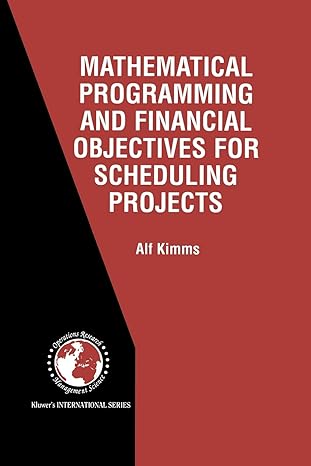Go back


Mathematical Programming And Financial Objectives For Scheduling Projects(1st Edition)
Authors:
Alf Kimms

Cover Type:Hardcover
Condition:Used
In Stock
Include with your book
Free shipping: April 04, 2024Popular items with books
Access to 3 Million+ solutions
Free ✝
Ask 10 Questions from expert
200,000+ Expert answers
✝ 7 days-trial
Total Price:
$0
List Price: $54.99
Savings: $54.99(100%)
Book details
ISBN: 1461355613, 978-1461355618
Book publisher: Springer
Get your hands on the best-selling book Mathematical Programming And Financial Objectives For Scheduling Projects 1st Edition for free. Feed your curiosity and let your imagination soar with the best stories coming out to you without hefty price tags. Browse SolutionInn to discover a treasure trove of fiction and non-fiction books where every page leads the reader to an undiscovered world. Start your literary adventure right away and also enjoy free shipping of these complimentary books to your door.
Mathematical Programming And Financial Objectives For Scheduling Projects 1st Edition Summary: Mathematical Programming and Financial Objectives for Scheduling Projects focuses on decision problems where the performance is measured in terms of money. As the title suggests, special attention is paid to financial objectives and the relationship of financial objectives to project schedules and scheduling. In addition, how schedules relate to other decisions is treated in detail. The book demonstrates that scheduling must be combined with project selection and financing, and that scheduling helps to give an answer to the planning issue of the amount of resources required for a project. The author makes clear the relevance of scheduling to cutting budget costs. The book is divided into six parts. The first part gives a brief introduction to project management. Part two examines scheduling projects in order to maximize their net present value. Part three considers capital rationing. Many decisions on selecting or rejecting a project cannot be made in isolation and multiple projects must be taken fully into account. Since the requests for capital resources depend on the schedules of the projects, scheduling taken on more complexity. Part four studies the resource usage of a project in greater detail. Part five discusses cases where the processing time of an activity is a decision to be made. Part six summarizes the main results that have been accomplished.
Customers also bought these books
Frequently Bought Together
Top Reviews for Books
Keith lebanowski
( 4 )
"Delivery was considerably fast, and the book I received was in a good condition."










